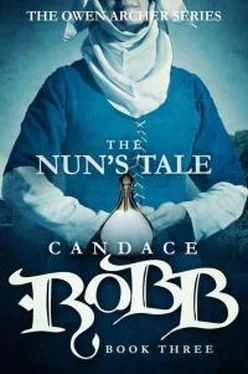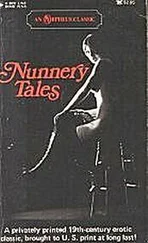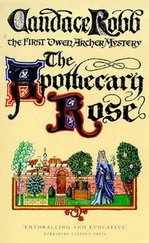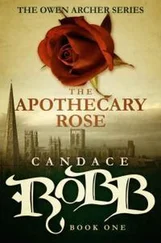As the five settled at the table, Thoresby spoke. “Forgive me if I seem distracted this evening, gentlemen. I have just learned that a nun from St Clement’s Priory in York has died of a fever in Beverley, a nun who had no permission to travel. She disappeared on St Etheldreda’s feast day.” He watched Louth and Wykeham tally up the days from 23 June. “She had been missing more than a month when she died, and the Reverend Mother had not reported her disappearance, nay, had excused Dame Joanna’s absence with a story of illness, a convalescence at home.”
“She was ill when she fled, then?” Wykeham asked.
“No. Though she apparently had a pallor that might be mistaken for illness from fasting and praying through the spring.”
“Ah. Lovesickness.” Louth said. He smiled into his wine.
“On the contrary,” Thoresby said. “Dame Isobel claimed the nun was the sort of young woman who believes that excesses of devotion bring her closer to God.”
The company grew quiet while servants laid out the fish course. As they withdrew, Ravenser shook his head. “A serious discrepancy in the story, Your Grace. A devoted nun does not run away.”
“Where in Beverley?” Louth asked, obviously caught up in his own thoughts.
Thoresby nodded to his nephew to continue the tale.
“A man kindly took her in when she collapsed in the street outside his house. She sank into a fever and died. The vicar of St Mary’s Church agreed to bury her at once, fearful she might poison the air.” Ravenser shook his head, sipped his wine. “But the priest wished me to inform His Grace and ask whether the family would want her body brought home to Leeds or whether the convent wished to claim her remains.”
“Beverley needs occasional excitement to wake it up,” Louth said with a cheerful grin. He chewed contentedly, his eyes half-closed, a man who enjoyed food and wine, particularly such excellent fare as was served in Thoresby’s household. “Who was the kind soul who took her in?”
“Will Longford.”
Louth leaned forward, suddenly wide awake. “Longford? A one-legged bear of a man?” He dabbed the grease from his chin.
Ravenser shrugged. “I have not had the honour of meeting him.”
Thoresby was interested. “You know him, Sir Nicholas?”
“I have had occasion to question Longford for the Prince,” Louth said. “He fought in the Free Companies under du Guesclin.”
“A peculiar good Samaritan.” Owen said. “I wonder what inspired such a man to tend a sick nun?”
Thoresby found that curious indeed. The Free Companies were bands of renegade soldiers with no national allegiance – though most were abandoned English soldiers – who terrorised the French countryside and then extorted protection money from the frightened people. A most unlikely source of charity.
Louth lifted an eyebrow. “An odd sympathy from a man who has most likely raped and killed nuns across the Channel.”
Ravenser nodded. “I daresay she was a piteous sight.” His posture toward Louth indicated an impatience with the man’s behaviour. Thoresby knew his nephew thought Louth a glutton and a fool.
Wykeham sat pensively holding a piece of bread in mid-air. Thoresby wondered what he was thinking. Sensing the archbishop’s eyes on him, Wykeham turned to his host. “What drew her to Beverley?”
Thoresby gave a fleeting smile. “An excellent question to which I have no answer.”
“An unfortunate story.”
“Perhaps her family can enlighten us,” Louth suggested. “What was her name?”
“Joanna Calverley,” Thoresby said. “I have asked Dame Isobel de Percy to inform her family. Perhaps she will learn something more.”
“Of Leeds, you said?” Louth asked.
Ravenser nodded.
“It is curious,” Louth frowned. “Why did she flee to Beverley, not Leeds?”
“Why indeed.” Thoresby sipped his wine. There was more to this than a runaway nun. He felt it in his bones. While the others went on to more amiable topics through the two meat courses, he brooded.
As the servants cleared and brought out the brandywine, Thoresby returned to the subject. “Why is the Prince interested in Longford, Sir Nicholas?”
Louth tapped his fingers on his cup and looked around at the company, weighing how much to say. “Now that du Guesclin is a captain in the service of King Charles of France, Prince Edward would like to know all he can about a man he will inevitably face in battle.”
“And was Longford helpful?” Ravenser asked.
Louth laughed. “Helpful? You would not ask had you ever met him. A slippery man, Will Longford. Much to hide. Oh, he told us a few things, but nothing to compromise du Guesclin.”
Owen leaned forward, his good eye turned to study Louth. “So it was not just information you wanted.”
Louth squirmed under the hawk-like regard. “No. I have the house watched.”
Wykeham was interested. “What do you think he does for du Guesclin?”
Louth shrugged. “I have proof of nothing. But men who might fight for our King have been taking ship to the continent to join the Free Companies.”
“Thus weakening us.” Thoresby nodded. “So you watch Longford’s house, and yet no one reported the arrival of a solitary nun.”
Louth sighed. “I know. What else have my men missed, you wonder. So do I.”
Wykeham noticed Thoresby’s brooding expression. “You think there is more to this nun’s death than an unhappy runaway struck down with fever?”
Thoresby met the eyes of the man who was positioning himself to take over as Lord Chancellor. Perhaps they were intelligent eyes. He shrugged.
“A nun runs away to a lover. ’Tis always the story,” Louth said, pouring more brandywine, though his face was flushed by what he had already imbibed. “Think no more of it.”
Thoresby closed his eyes, weary of idle speculation. He would like to know more about the dead nun, yet what would be the gain? She was dead, buried. He tapped his fingers impatiently in time with the steady plop of a new leak behind him, near the window. Perhaps the ominous ache in his bones was just the rain and his too many years of living.
1
Lamentations of the Dead
Late May 1366
Nicholas de Louth dropped his work and hurried out to the hall to greet Maddy, Will Longford’s servant. Surely she would not have come to Louth’s house unless she had received word of her master.
Longford had disappeared in March, slipped away in the night. When a few days had passed with no signs of activity in and round the house, Louth had had his men break in. They had found not a soul, not even the servant, Maddy. She had been discovered at her parents’ house, complaining of her abandonment. She had said that one evening Longford had told her to leave, that he and his man Jaro were going away. “With no more notice than that. He might have told me sooner. I might have arranged for work. I’ve no wages now.” Longford had said he would come for her when he returned. “He left that night. I’ve heard nothing since.”
A search had revealed that someone had gone through Longford’s house before Louth’s men, scattering things everywhere. They had found more than a dozen daggers, several swords of French make, one of Italian, and – the prize – a letter with Bertrand du Guesclin’s seal acknowledging monies owed Longford. It was not proof of treason, not even signed, but it was a link with du Guesclin, however ambiguous. Louth would be less gentle in questioning Longford next time. They had also found some puzzling items, including a bottle of Italian glass that held a white powder. Maddy had recognised it. She’d said that the nun who had died at Longford’s the previous summer had brought it with her, offering it to Longford as a relic. Louth had taken it home with the weapons and the letter.
Читать дальше












